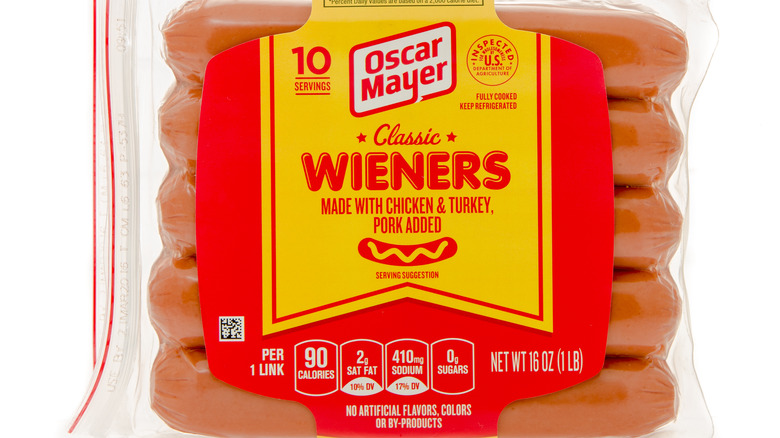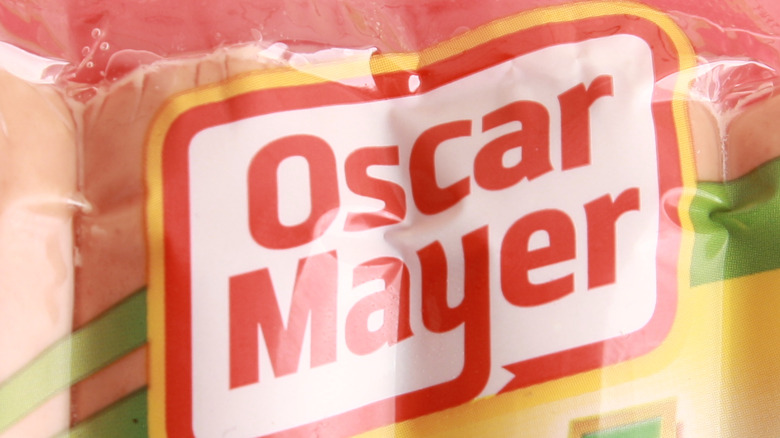Was Oscar Mayer A Real Person?
Who doesn't, after all, wish they were an Oscar Mayer wiener, as, according to the iconic jingle, that would mean everyone would be in love with them. Sounds good, right? Oscar Mayer is synonymous with meat, specifically lunch meat, and, oh yeah, that sausage-like link that has become essential fare at picnics, bonfires, ball-parks, and all things social in this, the land of the hot dog.
The quintessential sausage (yes, hot dogs are by definition, sausages) came with the flood of European immigrants, looking to the amber waves of grain for a place to call home in the nineteenth century. Sausage vending was an inexpensive and fairly common means for the enterprising immigrant to make their way in their new abode (TheHotDog.org). The Oscar Mayer company was born of this trend. The company opened their first store, the Oscar Mayer meat shop, in Chicago in 1883 and boasted first-day sales of $59.
Though meat-makers typically did not brand their goods back then, the company wanted customers to recognize their products and took on the "Edelweiss" moniker, which lasted for 13 years. After that, according to Mentalfloss, the brand became known as "Oscar Mayer Approved Meat Products." They took the branding concept further with the yellow band that wrapped its hot dogs and continue to use the device today.
The man behind the Oscar Mayer brand
So, who was the genius behind the innovating packaging and sumptuous sausages? The man, who was, indeed, a real person, is the enterprising, creative, and groundbreaking being known as Oscar Mayer. In 1873, 14-year-old Oscar F. Mayer, the soon-to-be meat maven, departed Bavaria, according to the Oscar Mayer company. Destination: the land of opportunity. He landed first in Detroit, where he worked as a butcher boy, but soon headed to Chicago.
Reference for Business reports that it took just seven years for the hot dog icon to learn all there was to know about the meat business. Along those lines, he encouraged his brother, Gottfried, to learn how to make sausages in Germany, and Gottfried did just that. When the lease for their first store expired in 1888, the building's owner refused to renew the lease, so the brothers, (a third, Max, had joined the party as well) borrowed $10,000 and opened their own location, which was an overwhelming success.
Trailblazer that he was, Oscar Mayer was ahead of the pack when it came to packaging. Though meat safety and hot dogs are not usually perceived as a pairing, Oscar Mayer was actually an early supporter of the concept. In 1906, when the US government implemented the Federal Meat Inspection act, Oscar Mayer bucked the trend among meat companies to fight the legislation and was supportive of the idea (via Mentalfloss).
Oscar Mayer lives on
When the company's patriarch passed in 1955 at the age of 95, the company's annual sales were more than $150 million (via Reference For Business). He was succeeded by his son, Oscar G. Mayer, who took over as chairperson, and grandson, Oscar G. Mayer Jr., who assumed the role of company president.
Though the wunderkind of the meat industry was no longer alive to see two of the most famous commercials ever created come to fruition, he surely would have approved of the "Wish I Were an Oscar Mayer Wiener" and subsequent "My Bologna Has a First Name" jingles that were ear worms for nearly every American when they were first introduced. Bologna became a staple lunch meat, thanks to the vacuum-sealed packaging introduced by this meat mega-manufacturer in the 1950's, and in 1973 the jingle put it over the top, cementing Oscar Mayer's place as the king of lunch meat (via Eater).
And, as the company floundered in the 1980's, due in part to health concerns related to bologna, but was revived with the creation of Lunchables, we have to believe that the late Mayer would have smiled a nod of approval at the marketing genius of this simple product. Good to know that the legacy, and ingenuity, of this German immigrant and American success story lives on.


